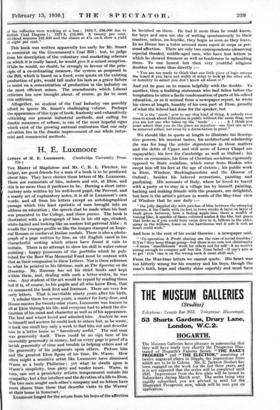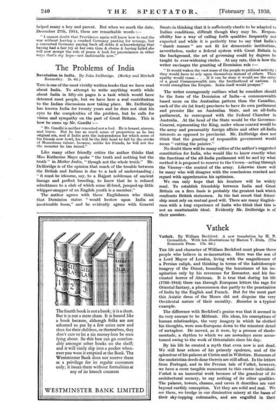H. E. Luxmoore
TUE Master of Magdalene and Mr. C. R. L. Fletcher, his helper, are good friends for a man if a book is to be produced about him. They have chosen these letters of Mr. Ltunoore. There are memorials of him, indoors and out, at Eton, and 1 this is no-more than it professes to be. Barring a short intro- ductory note written by his well-loved pupil, the Provost, and a scanty set of explanatory notes, it is all in Luxmoore's own words, and all from his letters except an autobiographical passage which this least egotistic of men brought into an address on education ; the speech that he made when his bust was presented to the College, and three poems.. The book is illustrated with a photograph of him in his old age, cloaked, white-haired and looking like an austere but paternal Abbe : it recalls the younger profile so like the images stamped on Impe- rial Roman or mediaeval Italian medals. There is also a photo- . graph of a page written by him, an old English carol in his characterful writing which others have found it vain to imitate. There is no attempt to shbw his skill in water-colour painting ; happy possessors of the portfolio which he pub- lished for the Boer War Memorial Fund must be content with that as their companion to these Letters. Nor is there reference to what he printed in his lifetime, such as The Sparrow on the Housetop. Mr. Ramsay has set his Strict limits and kept' within them, and, dealing with such a letter-writer, he was wise. Any student of the art would be repaid by reading them but it is, of course, to his pupils and all who know Eton, that we commend the book first and forethost. There are very few early letters. That is inevitable ninety years after his birth.
A scholar there for seven years, a master for forty-four, and House-master for twenty-nine years, Luxmoore was known to all at Eton through his life, and everyone had to admit the dis- tination of his mind and character as well as of his appearance. The best and wisest loved and admired him. Austere he was to himself and austere he could look to others but, as he wrote, it took one small boy only a week to find him out and describe him in a letter home as " harmlessly awful." The real man was generosity itself. There 'could be no sign here of his unworldly generosity in money, but on every page is proof of a lavish generosity of time and trouble in helping others and of the generosity of his judgments upon others. Picture him and the greatest Eton figure of his time, Dr. Warre. How often might a sensitive artist like Luxmoore have dismissed Warre as a burly Philistine ; yet what he dwells upon is Warre's simplicity, true piety and tender heart. Warre, in turn, saw not a pernickety artistic temperament outside his sympathy, but a fine intellect and the devotion of a life to Eton. The two men sought each other's company and no letters have more charm than those that describe visits to the Warres' at their home in Somerset.
Luxmoore longed for the return from his boys of the affection
he lavished on them. He had it more than he could know, for boys and men are shy of writing spontaneously to their masters, unless, un-boylike, they begin as soon as they leave. In no House has a tutor aroused more esprit de corps or per- sonal affection. There are only two correspondents (deserving especial thanks), middle-aged men, who have lent letters in which he showed firmness as well as tenderness in upbraiding
them. To one honest but then very youthful religious doubter he wrote thus directly :—
" You are too ready to think that one little piece of logic sweeps the board & you have not width of mind to look at the other side, or humility to admit you don't know all about it."
And yet he goes on to reason helpfully with the doubts. To another, then a budding statesman who had fallen before the temptation to utter a facile condemnation of parts of his school education, or so it seemed from a newspaper report, he wrote his views at length, humbly of his own part at Eton, proudly of what the School had done for the speaker, but
" It is the ' mode ' now to say this kind of thing, & nobody ever rises to speak about Education in public without the same fling, now
you are not one who takes up the mode ' & I think you must admit that you do the place an injustice—one that can never be removed either, not even by a detractation in print."
We should like to quote at length to illustrate his descrip- tive powers, his musical tastes, his architectural scholarship (he was for long the arbiter elegantiarum in those matters and the debts of Upper and still more of Lower Chapel are unpayable); his love for Cambridge as well as Oxford ; his views on economics, his form of Christian socialism,vigorously opposed to State socialism, which came from Ruskin who swept 'him off his feet at the age of sixteen ; his public work in Eton, Windsor, Buckinghamshire and the Diocese of Oxford ; besides his beloved recreations, painting and gardening. His accounts of Italy, where he loved to travel with a party or to stay in a village inn by himself, painting, bathing and making friends with the peasants, are delightful, but here is the artist's picture in words of the May-time view of Windsor that he saw daily the jolly dappled sky with patches of blue between the sweeping showers, & the Castle with its feet in town smoke & layer on layer of fresh green between, here a fading apple-tree, there a wealth of tossing lilac, & sparkle of flame coloured azalea & the like, but green that looks as if you could bury swim dive in' it, billows in the elder, spray in the willows, foam on the hawthorn wet & soft & rich as heart could wish."
And here is the root of his social theories : a newspaper said, " Co-operation & Profit sharing are the cure of social troubles.' O Yes 1 they keep things going—but there is no cure but christianity —I mean unselfishness ' work for others not for self—& no motive strong enough to conquer self but the Xian belief—If one's aim is to get ' rich ' one is on the wrong tack & must shift sail."
From the War-time letters we cannot quote. His heart was too bitterly wrung for his country and his boys, though the man's faith, hope and charity shine superbly and must have helped many a boy and parent. But when we mark the date, December 27th, 1914, these are remarkable words :—
" I cannot doubt that Providence again will know how to end the war without leaving a crushed Germany panting for revenge, but a converted Germany paying back all debts & acknowledging that having had a fair try at het own time & choice & having failed ahe will now accept. the role of peace & look for preeminence in other ways that's my hope—not fashionable now."











































 Previous page
Previous page